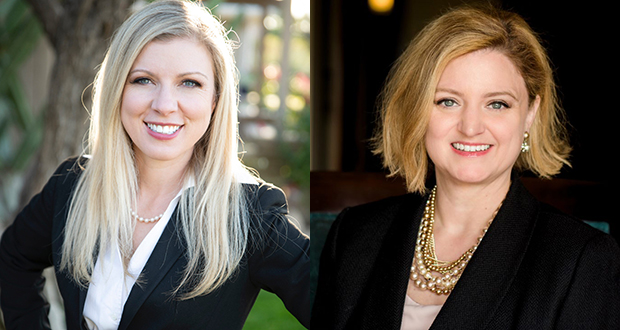

By Lauren Smith
MARICOPA COUNTY, AZ – Maricopa County Attorney Republican incumbent Allister Adel and Democratic challenger Julie Gunnigle Friday evening traded barbs and debated criminal justice reforms in a race to become the next county attorney in the 3rd largest public prosecutorial agency in the nation.
In her opening statement, Adel stated that she has a long “record of accomplishments” in her past year as county attorney, adding she plans on continuing to “hold criminals [and] the most dangerous…accountable.” Adel challenged the statements Gunnigle would make throughout the debate calling them “well-rehearsed lines and empty rhetoric.”
In her opening statement, Gunnigle said that Arizona has “the worst racial disparities when it comes to sentencing and policing in the nation.” She claimed that the current criminal system is “broken” and as county attorney she will work to create a system that is “tough, smart and fair.”
When questioned on the high incarceration rate in the county, (877/100,000 people are incarcerated), Adel agreed that it is “too high.” She stated that in the past year as county attorney, she has created a “robust diversion program” to help treat the relationship between drug abuse and mental illness. Adel emphasize the importance of eliminating “the financial barrier so that people can  participate in those programs.”
participate in those programs.”
To the same question, Gunnigle discussed how she plans to decrease the incarceration rate by 26 percent. She claimed that Maricopa county spends “1.2 billion dollars every year in our criminal justice system” which is “more than we spend in our world class university system…community college system…and more than our public health system combined.”
Gunnigle said she will create diversion and deflection programs, create specialty court systems and put an end to charge stacking policies such as Hannah priors which allow someone to be sentenced as a repeat criminal offender the first time they see a judge. Hannah priors also allow prosecutors to stack charges creating disproportionately long sentences.
She further claimed that the current diversion program Adel instituted is “a band-aid on a bullet wound” because people who experience “repeated instances of addiction don’t have that opportunity to do better and be better.”
Adel clarified on drug policy in the county stating, “you don’t go to prison for your first drug offense” and emphasized an “overhaul if every single plea policy” in order to give more discretion to lawyers in order to make sure they come to the “right conclusion.”
The moderators then asked a series of questions involving Deon Johnson, a motorist sleeping along a freeway when he was shot by a Public Safety Trooper George Cervantes.
Gunnigle criticized Adel’s decision to not charge Cervantes calling it an act of “cowardice.”
She added Maricopa County must have a better way of handling police use of force cases. Gunnigle challenged Adel, suggesting she “could not be bothered” to look at the trooper’s DPS file that “revealed 13 separate acts of misconduct. One of which was tasing a puppy with a state issued taser.”
Gunnigle also critiqued Adel’s new community involved process for being “more obscure and less transparent.” These community members are unknown to other community members in Maricopa County because each person signed a Non-Disclosure Agreement. Gunnigle stated this is “not good government” and advocated for increased transparency from the county attorney’s office.
Gunnigle stated that as county attorney, she would have approached Dion Johnson’s case with an “independent unit to evaluate these police use of force cases.” She also emphasized that there have been 430 officer involved shootings since 2001; however, only two officers have been charged.
In response, Adel stated “the process has never been more transparent.” She further stated that “we knew about Officer Cervantes’ background” prior to the shooting of Johnson.
Adel also claimed that as county attorney she has prosecuted police officers for “rape” and “pornography” and emphasized that regardless of whether you are a police officer or a community member, “if you commit a crime in Maricopa County, you will be held accountable.”
As for the community member process, Adel claimed that every member receives training on police use of force and that she will not release the names for “public safety reasons.”
However, Adel stated that they will release the demographics of this community panel and claimed that the “very diverse group” includes four community members.
She further stated that she is now asking for body-worn cameras “for all officers in the field.” In order to achieve utilizing the cameras to the highest ability she has a three-part solution.
The first party includes resources and training for officers in the field, “meaning don’t defund the police. That’s just rhetoric and now apparently, we are calling it something like reallocating resources, it’s the same thing.” The second part is ensuring that community resources are available for the mentally ill and drug addicts. The third part is having a strong prosecution agency to “hold people accountable.”
Gunnigle immediately challenged Adel’s diversity claim stating that “four individuals can’t possibly make up the relevant cross-section of who actually lives here.”
She also argued body-worn cameras are only the first step in reforming the system. In addition, the footage needs to released “promptly.”
Gunnigle cited the Ryan Whittaker incident – he was shot in the doorway of his home by Phoenix police officers in July. His family waited 54 days for the body camera footage to be released – 54  days they waited for the “truth.”
days they waited for the “truth.”
Gunnigle claimed that in addition to body cameras, there needs to be more de-escalation training and bans on chokeholds. She also said that taking nine months to a year to investigate an officer-involved shooting is “all politics.”
When asked about Proposition 207, the legalization of possession and recreational use of marijuana for anyone 21 and older and requiring the Arizona Department of Health Services to regulate the marijuana business, Gunnigle said she will be voting yes, adding “we should no longer prosecute low-level marijuana offenses.”
Adel said that they are taking a “treatment first approach” and want to get people “the help that they need to do better and be better…we just want compliance. That’s it.” She stated that prop. 207 is not “retroactive” and does concern her as a citizen because “as a mom of two I don’t want access for my children. I’m concerned about driving under the influence and how we regulate that.”
In her concluding statement, Adel said as the first woman county attorney she has a “record of accomplishments.” She insisted the job is about “doing the right thing” and protecting victims rights as well as families and children.
Gunnigle charged the Maricopa County Attorney Office has “bred community distrust” and emphasized how the current administration “does not have a single person of color anywhere near her attorney leadership team.” She concluded that now is a time for action “rather than mere conversation.”
To sign up for our new newsletter – Everyday Injustice – https://tinyurl.com/yyultcf9
Support our work – to become a sustaining at $5 – $10- $25 per month hit the link: